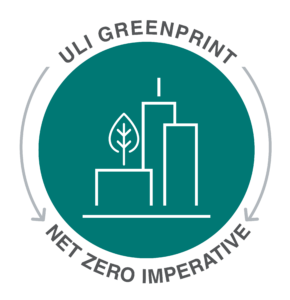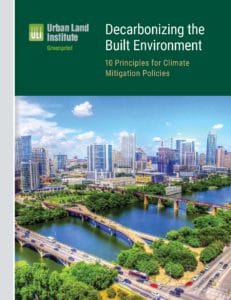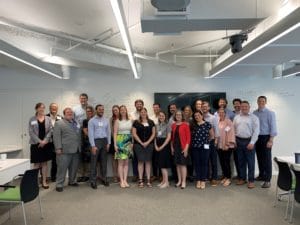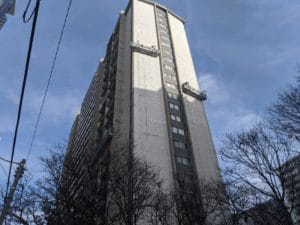City Engagement
Engaging Cities on Climate Mitigation Strategies for Real Estate
The Decarbonization Program’s city engagement initiative expedites the adoption of sustainability programs in cities by creating a network of like-minded organizations and building connections between policymakers and the development community to create mutually beneficial policies. ULI intends to continue building on these conversations by identifying value-enhancing best practices in city sustainability policies through future convenings and reports.
ULI Net Zero Imperative
 The ULI Net Zero Imperative (NZI) is a multi-year initiative to accelerate decarbonization in the built environment and is a significant aspect of ULI’s work to advance its net zero mission priority. The program sponsors technical assistance panels in a select number of global cities per year and is designed to help building owners, cities, and other relevant constituents reduce carbon emissions associated with buildings, communities, and cities. Learn more here!
The ULI Net Zero Imperative (NZI) is a multi-year initiative to accelerate decarbonization in the built environment and is a significant aspect of ULI’s work to advance its net zero mission priority. The program sponsors technical assistance panels in a select number of global cities per year and is designed to help building owners, cities, and other relevant constituents reduce carbon emissions associated with buildings, communities, and cities. Learn more here!
Decarbonizing the Built Environment – 10 Principles for Climate Mitigation Policies

In May 2018, at ULI Spring Meeting in Detroit, Michigan, the ULI Center for Sustainability and Economic Performance hosted an inaugural City and Real Estate Sustainability Summit (summary here). A follow-up event was held during the 2018 Fall Meeting in Boston, Massachusetts (summary here). During these events, participants gained a better understanding of city sustainability manager and real estate developer processes and perspectives and discussed key sustainability issues like energy efficiency and climate mitigation, resilience, and health. Read the report here!
 In summer 2019, ULI brought together public-sector policymakers and ULI members for the Public/Private Partnerships for Climate Mitigation workshop to identify best practices that facilitate collaboration between the public and private sectors to achieve value-enhancing climate policy. To distill the lessons learned from these three workshops and bring this conversation to a broader U.S. audience, ULI is developing a “10 Principles” document highlighting public/private partnerships on climate mitigation in order to identify key aspects of successful and collaborative climate policy. The report is grounded in the context of specific communities and best practices from their building-level climate mitigation policies. It is intended to serve as an ongoing tool for cities, real estate leaders, and other stakeholders.
In summer 2019, ULI brought together public-sector policymakers and ULI members for the Public/Private Partnerships for Climate Mitigation workshop to identify best practices that facilitate collaboration between the public and private sectors to achieve value-enhancing climate policy. To distill the lessons learned from these three workshops and bring this conversation to a broader U.S. audience, ULI is developing a “10 Principles” document highlighting public/private partnerships on climate mitigation in order to identify key aspects of successful and collaborative climate policy. The report is grounded in the context of specific communities and best practices from their building-level climate mitigation policies. It is intended to serve as an ongoing tool for cities, real estate leaders, and other stakeholders.
 “It is critical for the real estate community to engage with local governments across the country to help shape sustainability agendas at the local level. By engaging with cities, we ensure that cities are well informed about the unique aspects of the real estate sector and how they can play a positive role in addressing climate change and environmental issues.”Jonathan Flaherty, senior director of sustainability and utilities, Tishman Speyer
“It is critical for the real estate community to engage with local governments across the country to help shape sustainability agendas at the local level. By engaging with cities, we ensure that cities are well informed about the unique aspects of the real estate sector and how they can play a positive role in addressing climate change and environmental issues.”Jonathan Flaherty, senior director of sustainability and utilities, Tishman Speyer
Advisory Services Panels
Advisory Services panels provide expert, independent, timely, candid, and unbiased input from national real estate, land use, design, and planning experts. A number of recent Advisory Services Panels have focused on cities looking for best practices to achieving climate goals while also supporting economic development and affordable housing. Recent Panels supported by Greenprint include:
BID Sustainability, Washington, D.C.
|
Tower Sustainability, Toronto, ON
|
Previous City Reports
To enhance impact and help accelerate market transformation, Greenprint has also partnered with San Francisco, Washington D.C.’s DowntownDC BID, the 2030 Districts Network, the City Energy Project, among other organizations.

